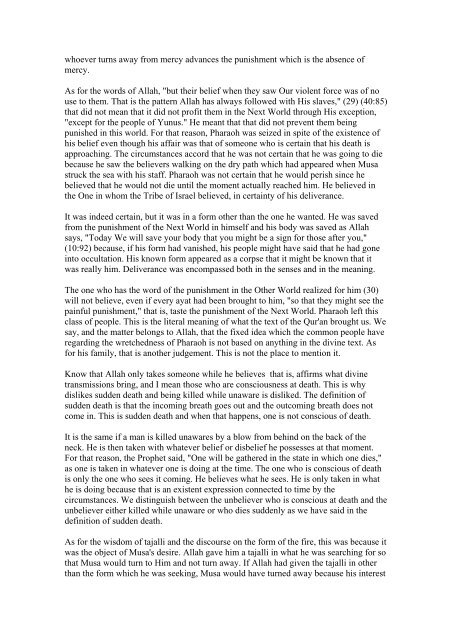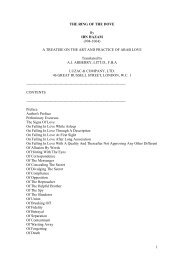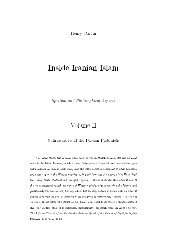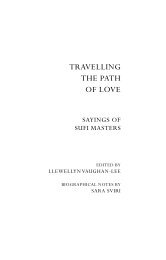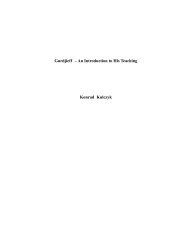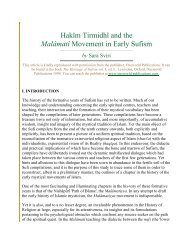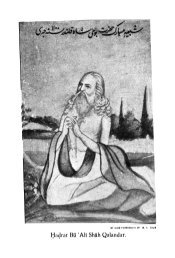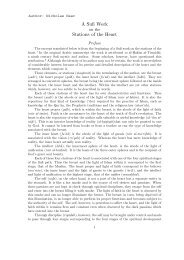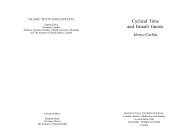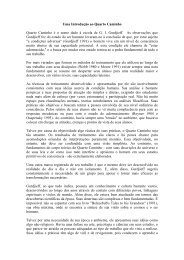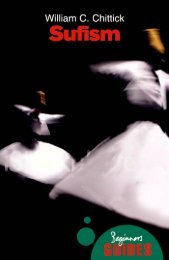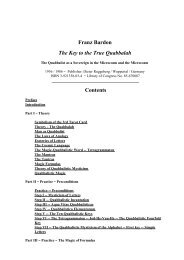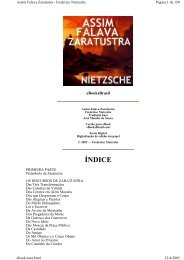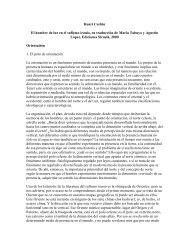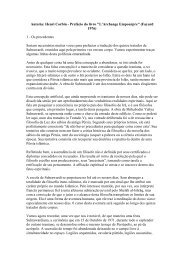Fusus al-Hikam The Seals of Wisdom by Shaykh al ... - ImagoMundi
Fusus al-Hikam The Seals of Wisdom by Shaykh al ... - ImagoMundi
Fusus al-Hikam The Seals of Wisdom by Shaykh al ... - ImagoMundi
Create successful ePaper yourself
Turn your PDF publications into a flip-book with our unique Google optimized e-Paper software.
whoever turns away from mercy advances the punishment which is the absence <strong>of</strong><br />
mercy.<br />
As for the words <strong>of</strong> Allah, "but their belief when they saw Our violent force was <strong>of</strong> no<br />
use to them. That is the pattern Allah has <strong>al</strong>ways followed with His slaves," (29) (40:85)<br />
that did not mean that it did not pr<strong>of</strong>it them in the Next World through His exception,<br />
"except for the people <strong>of</strong> Yunus." He meant that that did not prevent them being<br />
punished in this world. For that reason, Pharaoh was seized in spite <strong>of</strong> the existence <strong>of</strong><br />
his belief even though his affair was that <strong>of</strong> someone who is certain that his death is<br />
approaching. <strong>The</strong> circumstances accord that he was not certain that he was going to die<br />
because he saw the believers w<strong>al</strong>king on the dry path which had appeared when Musa<br />
struck the sea with his staff. Pharaoh was not certain that he would perish since he<br />
believed that he would not die until the moment actu<strong>al</strong>ly reached him. He believed in<br />
the One in whom the Tribe <strong>of</strong> Israel believed, in certainty <strong>of</strong> his deliverance.<br />
It was indeed certain, but it was in a form other than the one he wanted. He was saved<br />
from the punishment <strong>of</strong> the Next World in himself and his body was saved as Allah<br />
says, "Today We will save your body that you might be a sign for those after you,"<br />
(10:92) because, if his form had vanished, his people might have said that he had gone<br />
into occultation. His known form appeared as a corpse that it might be known that it<br />
was re<strong>al</strong>ly him. Deliverance was encompassed both in the senses and in the meaning.<br />
<strong>The</strong> one who has the word <strong>of</strong> the punishment in the Other World re<strong>al</strong>ized for him (30)<br />
will not believe, even if every ayat had been brought to him, "so that they might see the<br />
painful punishment," that is, taste the punishment <strong>of</strong> the Next World. Pharaoh left this<br />
class <strong>of</strong> people. This is the liter<strong>al</strong> meaning <strong>of</strong> what the text <strong>of</strong> the Qur'an brought us. We<br />
say, and the matter belongs to Allah, that the fixed idea which the common people have<br />
regarding the wretchedness <strong>of</strong> Pharaoh is not based on anything in the divine text. As<br />
for his family, that is another judgement. This is not the place to mention it.<br />
Know that Allah only takes someone while he believes that is, affirms what divine<br />
transmissions bring, and I mean those who are consciousness at death. This is why<br />
dislikes sudden death and being killed while unaware is disliked. <strong>The</strong> definition <strong>of</strong><br />
sudden death is that the incoming breath goes out and the outcoming breath does not<br />
come in. This is sudden death and when that happens, one is not conscious <strong>of</strong> death.<br />
It is the same if a man is killed unawares <strong>by</strong> a blow from behind on the back <strong>of</strong> the<br />
neck. He is then taken with whatever belief or disbelief he possesses at that moment.<br />
For that reason, the Prophet said, "One will be gathered in the state in which one dies,"<br />
as one is taken in whatever one is doing at the time. <strong>The</strong> one who is conscious <strong>of</strong> death<br />
is only the one who sees it coming. He believes what he sees. He is only taken in what<br />
he is doing because that is an existent expression connected to time <strong>by</strong> the<br />
circumstances. We distinguish between the unbeliever who is conscious at death and the<br />
unbeliever either killed while unaware or who dies suddenly as we have said in the<br />
definition <strong>of</strong> sudden death.<br />
As for the wisdom <strong>of</strong> taj<strong>al</strong>li and the discourse on the form <strong>of</strong> the fire, this was because it<br />
was the object <strong>of</strong> Musa's desire. Allah gave him a taj<strong>al</strong>li in what he was searching for so<br />
that Musa would turn to Him and not turn away. If Allah had given the taj<strong>al</strong>li in other<br />
than the form which he was seeking, Musa would have turned away because his interest


